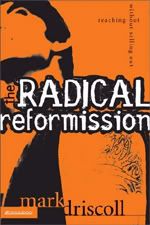 When I read Radical Reformission: How to reach out without selling out by Mark Driscoll last year, it really jacked me up. Since I had become a Christian, I had been taught that I needed to squeeze into a certain mold in order to be found acceptable. Driscoll taught me that I could keep my unique personality intact while following Jesus. He also convicted me of loving Jesus but not loving people, especially people who do not know Jesus. That book messed me up so bad that I had to re-read it at least 3 times in order to fully understand how my life would change as a result of "reaching out without selling out."
When I read Radical Reformission: How to reach out without selling out by Mark Driscoll last year, it really jacked me up. Since I had become a Christian, I had been taught that I needed to squeeze into a certain mold in order to be found acceptable. Driscoll taught me that I could keep my unique personality intact while following Jesus. He also convicted me of loving Jesus but not loving people, especially people who do not know Jesus. That book messed me up so bad that I had to re-read it at least 3 times in order to fully understand how my life would change as a result of "reaching out without selling out."
Shane Claiborne's
Irresistible Revolution: living as an ordinary radical holds the potential to do almost as much damage to my life for the cause of Jesus. For more information about Shane, go to the
Simple Way, the semi-homeless community in which he lives. I am going to simply say, "Read this book."
And I am going to list some notable excerpts here:"Some of us haven't even asked the right questions, or found a church that would let us."
"I had become a believer, but I had no idea what it meant to be a follower. People had taught me what Christians believe, but no one had told me how Christians live."
"We decided to stop complaining about the church we saw, and we set our hearts on becoming the church we dreamed of."
Quoting Soren Kierkegaard, 'The matter is quite simple. The Bible is very easy to understand. But we Christians are a bunch of scheming swindlers. We pretend to be unable to understand it because we know very well that the minute we understand, we are obliged to act accordingly. 'My God', you will say, 'if I do that my whole life will be ruined. How would I ever get on in the world'?'"
Quoting the late Rich Mullins, "You guys are into that born again thing, which is great. We do need to be born again, since Jesus said that to a guy named Nicodemus. But if you tell me I have to be born again to enter the kingdom of God, I can tell you that you have to sell everything you have and give it to the poor, because Jesus said that to one guy too. But I guess that's why God invented highlighters, so we can highlight the parts we like and ignore the rest."
"That doesn't mean rich people are excluded or not welcome. It means that it is nearly impossible for them to catch the vision of interdependent community, dependent on God and one another. Rich folks, while they may be starving for God and community, still believe the illusion that they are self-sufficient autonomous individuals, and that belief is incompatible with the gospel."
"I'm not sure we need more churches. What we really need is 'a church'. I have tried to remove the plural form 'churches' from my vocabulary, training myself to think of the church as Christ did, and as the early Christians did."
On his experience in Iraq, "I was shocked to find so many Christians in Iraq. I was floored by my ignorance and by the ancient roots of my faith. This was the land of my ancestors. Christianity was not invented in America....how about that?"
"Sometimes people ask me if I am scared, living in the inner city. I usually reply, 'I'm more scared of the suburbs.' While the ghettos may have their share of violence and crime, the suburbs are the home of the more subtle demonic forces - numbness, complacency, comfort - and it is these that can eat away at our souls."
"The higher a person's frequency of church attendance, the more likely they are to be sexist, racist, anti-gay, pro-military, and committed to their local church."
"The pervasive myth is that as a church grows larger, it can do more good. As congregations grow in terms of staff and property, their giving to causes outside of operating expenses decreases dramatically, especially money given directly to the poor. Rich people are significantly less generous than poor people proportionately, and large congregations give proportionately far less to people in poverty than do small ones. In fact, they rarely even have poor people among them."
Claiborne concludes the book with a four-page list of organizations (also available on the Simple Way website) that are looking to revolutionize the church through social action.







 There are three reasons I wanted to check out
There are three reasons I wanted to check out 

 Pastor Rick Mckinley
Pastor Rick Mckinley
















